This Week in Labor History
September 18
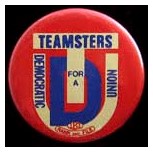 The Teamsters for a Democratic Union (TDU) is formally founded at an Ohio convention, during a period of serious corruption in the union. Two years earlier at an IBT convention in Las Vegas, a union reform leader who (unsuccessfully) called for direct election of officers and a limit on officers’ salaries had been beaten by thugs – 1978
The Teamsters for a Democratic Union (TDU) is formally founded at an Ohio convention, during a period of serious corruption in the union. Two years earlier at an IBT convention in Las Vegas, a union reform leader who (unsuccessfully) called for direct election of officers and a limit on officers’ salaries had been beaten by thugs – 1978
Nine strikebreakers are killed in an explosion at Giant (gold) Mine near Yellowknife, in Canada’s Northwest Territories. Miner Roger Warren confessed that he planted the explosives that caused the deaths. He recanted the confession but later confessed once again – 1992
A 20-month illegal lockout of 2,900 Steelworkers members at Kaiser Aluminum plants in three states ends when an arbitrator orders a new contract. Kaiser was forced to fire scabs and fork over tens of millions of dollars in back pay to union members – 1999
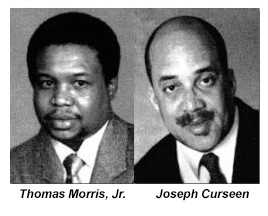 One week after the September 11, 2001, attacks, anthrax spores are mailed by an unknown party to several news media offices and two U.S. senators. Five people exposed to the spores died, including two workers at Washington, D.C.’s USPS Brentwood facility: Thomas Morris, Jr. and Joseph Curseen, who were to die of their exposure within the month – 2001
One week after the September 11, 2001, attacks, anthrax spores are mailed by an unknown party to several news media offices and two U.S. senators. Five people exposed to the spores died, including two workers at Washington, D.C.’s USPS Brentwood facility: Thomas Morris, Jr. and Joseph Curseen, who were to die of their exposure within the month – 2001
September 19
Chinese coal miners forced out of Black Diamond, Wash. – 1885
 Between 400,000 and 500,000 unionists converge on Washington D.C., for a Solidarity Day march and rally protesting Republican policies – 1981
Between 400,000 and 500,000 unionists converge on Washington D.C., for a Solidarity Day march and rally protesting Republican policies – 1981
Musician and labor educator Joe Glazer, often referred to as “Labor’s Troubadour,” died today at age 88. Some of his more acclaimed songs include “The Mill Was Made of Marble,” “Too Old To Work” and “Automaton.” In 1979 he and labor folklorist Archie Green convened a meeting of 14 other labor musicians to begin what was to become the annual Great Labor Arts Exchange and, soon thereafter, the Labor Heritage Foundation – 2006
September 20
Upton Sinclair, socialist and author of The Jungle—published on this day in 1906—born in Baltimore, Md. – 1878
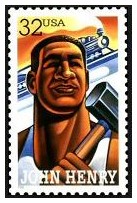 According to folklorist John Garst, steel-drivin’ man John Henry, born a slave, outperformed a steam hammer on this date at the Coosa Mountain Tunnel or the Oak Mountain Tunnel of the Columbus and Western Railway (now part of the Norfolk Southern) near Leeds, Ala. Other researchers place the contest near Talcott, W. Va. – 1887
According to folklorist John Garst, steel-drivin’ man John Henry, born a slave, outperformed a steam hammer on this date at the Coosa Mountain Tunnel or the Oak Mountain Tunnel of the Columbus and Western Railway (now part of the Norfolk Southern) near Leeds, Ala. Other researchers place the contest near Talcott, W. Va. – 1887
Int’l Hod Carriers, Building & Common Laborers Union of America changes name to Laborers’ Int’l Union – 1965
September 21
Militia sent to Leadville, Colo., to break miners’ strike – 1896
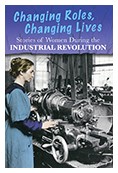 Mother Jones leads a march of miners’ children through the streets of Charleston, W. Va. – 1912
Mother Jones leads a march of miners’ children through the streets of Charleston, W. Va. – 1912
(Changing Roles, Changing Lives: Stories of Women During the Industrial Revolution: During the Industrial Revolution, workers were forced to endure dangerous working conditions for miserable wages. Among those who courageously spoke out against this poor treatment were some remarkable women, including Mary Harris “Mother” Jones and Sarah G. Bagley, whose stories are told here for young readers.)
National Football League Players Association members begin what is to become a 57-day strike, their first regular-season walkout ever – 1982
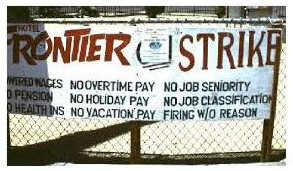 Members of five unions at the Frontier Hotel-Casino in Las Vegas begin what was to become the longest successful hotel strike in U.S. history. All 550 workers honored the picket line for the entirety of the 6-year, 4-month, 10-day fight against management’s insistence on cutting wages and eliminating pensions – 1991
Members of five unions at the Frontier Hotel-Casino in Las Vegas begin what was to become the longest successful hotel strike in U.S. history. All 550 workers honored the picket line for the entirety of the 6-year, 4-month, 10-day fight against management’s insistence on cutting wages and eliminating pensions – 1991
September 22
Emancipation Proclamation signed – 1862
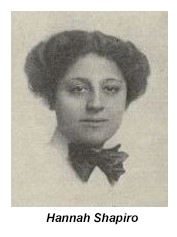 Eighteen-year-old Hannah (Annie) Shapiro leads a spontaneous walkout of 17 women at a Hart Schaffner & Marx garment factory in Chicago. It grows into a months-long mass strike involving 40,000 garment workers across the city, protesting 10-hour days, bullying bosses and cuts in already-low wages – 1910
Eighteen-year-old Hannah (Annie) Shapiro leads a spontaneous walkout of 17 women at a Hart Schaffner & Marx garment factory in Chicago. It grows into a months-long mass strike involving 40,000 garment workers across the city, protesting 10-hour days, bullying bosses and cuts in already-low wages – 1910
Great Steel Strike begins; 350,000 workers demand union recognition. The AFL Iron and Steel Organizing Committee calls off the strike, their goal unmet, 108 days later – 1919
Martial law rescinded in Mingo County, W. Va., after police, U.S. troops and hired goons finally quell coal miners’ strike – 1922
U.S. Steel announces it will cut the wages of 220,000 workers by 10 percent – 1931
United Textile Workers strike committee orders strikers back to work after 22 days out, ending what was at that point the greatest single industrial conflict in the history of American organized labor. The strike involved some 400,000 workers in New England, the mid-Atlantic states and the South – 1934
Some 400,000 coal miners strike for higher wages in Pennsylvania, West Virginia, Illinois and Ohio – 1935
The AFL expels the Int’l Longshoremen’s Association for racketeering; six years later the AFL-CIO accepted them back into the house of labor – 1953
 OSHA reaches its largest ever settlement agreement, $21 million, with BP Products North America following an explosion at BP’s Texas City, Texas, plant earlier in the year that killed 15 and injured 170 – 2005
OSHA reaches its largest ever settlement agreement, $21 million, with BP Products North America following an explosion at BP’s Texas City, Texas, plant earlier in the year that killed 15 and injured 170 – 2005
Eleven Domino’s employees in Pensacola, Fla., form the nation’s first union of pizza delivery drivers – 2006
San Francisco hotel workers end a 2-year contract fight, ratify a new 5-year pact with their employers – 2006
September 23
The Workingman’s Advocate of Chicago publishes the first installment of The Other Side, by Martin A. Foran, president of the Coopers’ Int’l Union. Believed to be the first novel by a trade union leader and some say the first working-class novel ever published in the U.S. – 1868
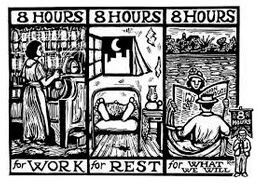 A coalition of Knights of Labor and trade unionists in Chicago launch the United Labor party, calling for an 8-hour day, government ownership of telegraph and telephone companies, and monetary and land reform. The party elects seven state assembly men and one senator – 1886
A coalition of Knights of Labor and trade unionists in Chicago launch the United Labor party, calling for an 8-hour day, government ownership of telegraph and telephone companies, and monetary and land reform. The party elects seven state assembly men and one senator – 1886
A 42-month strike by Steelworkers at Bayou Steel in Louisiana ends in a new contract and the ousting of scabs – 1996
California Gov. Gray Davis (D) signs legislation making the state the first to offer workers paid family leave – 2002
September 24
Canada declares the Wobblies illegal – 1918
—Compiled and edited by David Prosten
